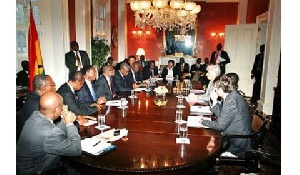The Civil Society Platform (CSP), a pressure group, on Tuesday organized a national forum to provide a unique avenue for citizens’ voices to be taken into account in the International Monetary Fund’s (IMF) Bailout agreement with Government.
The forum which was on the theme: “Facilitating National Dialogue and Advocating for Effective Implementation of IMF Bailout for Ghana”, seeks to promote public awareness and inclusiveness in the Bailout discussion between Ghana and the IMF, to arrive at common positions on the key issues for the benefit of Ghanaians.
Think-Thanks, academia, media, Religious bodies, Traditional Leaders, Employers Association, Trade Unions, Student Groups, Development Partners and professional bodies were expected to debate and come out with common positions which were pro-poor and people centered.
Key issue such as analyzing the reasons for the current fiscal crisis that has necessitated a bailout by the IMF, Lessons from previous bailout and programmes that should guide government in the negotiations in making concrete recommendations to both parties with respect to the new programme under negotiation.
Dr Godfred A. Bokpin, a Senior Lecturer and Head of Department of the University of the Ghana Business School, said the bailout would instill some level of discipline and credibility in government in terms of ensuring macroeconomic stability to put the country on the path of growth.
He said it would further moderate the level of economic uncertainty and influence many stakeholders especially investors and the foreign exchange market, in their relation to the country.
According to him the IMF bailout was an indication of a country’s total failure to remain disciplined in its spending, and acknowledged the fact that there was currently no other option left, than for government accept any conditions set under the agreement.
However, there must be a way of sharing the burden that accompanies such situations to ensure that the poor does not carry the burden alone, he said.
Dr Bokpin said successive governments since independence had inherited the culture of overspending national budgets during general elections.
The situation, he said, was often followed by a year of laxity by winning governments with very little national activities in terms of implementation of developmental programmes and projects to enhancing revenue, thereby creating a huge gap in expenditure and revenue.
He also attributed Ghana’s current fiscal deficit to the lack of efficiency in revenue collection, leakages, corruption, rising cost of doing business, high interest rates, poor utility services leading to the collapse of many companies, high wage-bill of the civil and public services resulting from ghost names and the high cost of servicing national debts among other things.
Dr Bokpin said making the private sector as the engine of growth as professed by government should have corresponded with maximum financial support to these sectors, particularly Small and Medium Scale Enterprises to help the grow and create the needed jobs and revenue for any meaningful development.
He said low funding to the private sector had affected Ghana’s export capacity as a result of the weaknesses in the domestic economy because of declines in areas such as manufacturing, agriculture and industry in general.
Other speakers including Mr Joseph Winful, Chairman of the CSP, Mr Kofi Bentil, Vice-President of IMANI Ghana and Mr Sydney Casely-Hayford, an economic analyst, called on Civil Society Organisations to rise up and demand responses from the government and ensure that the bailout is the last one.
Business News of Wednesday, 19 November 2014
Source: GNA

















